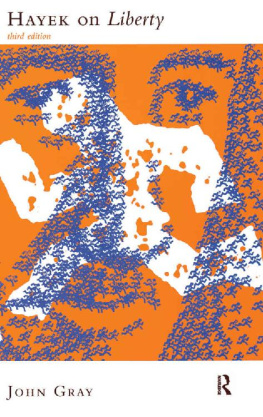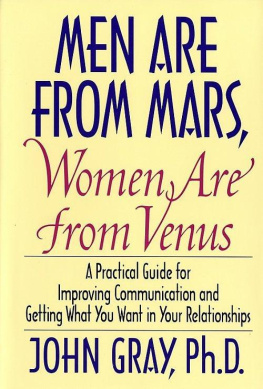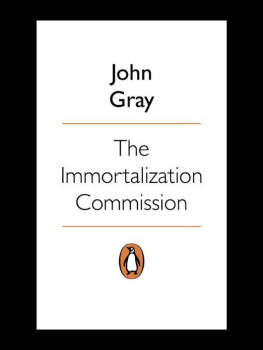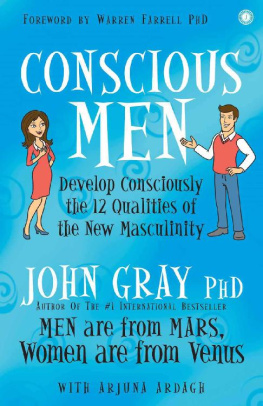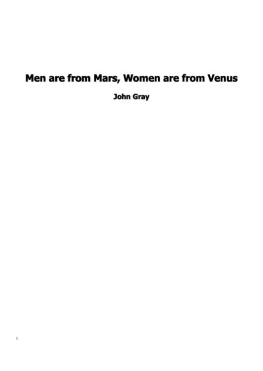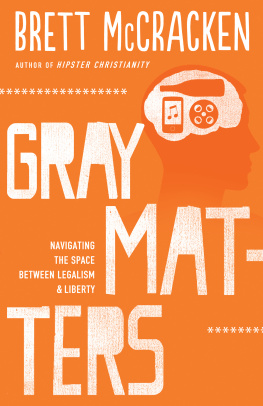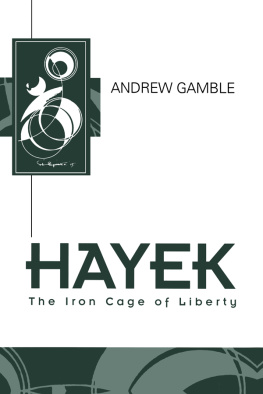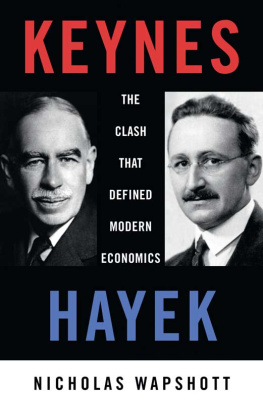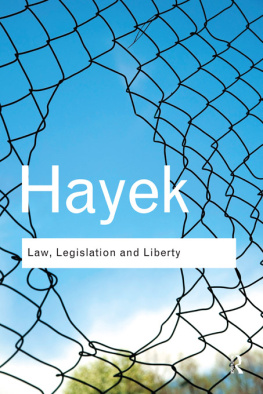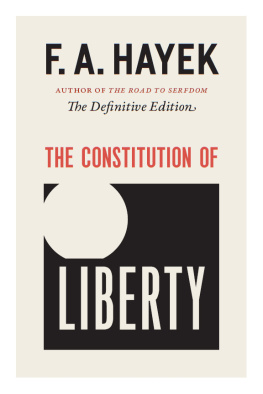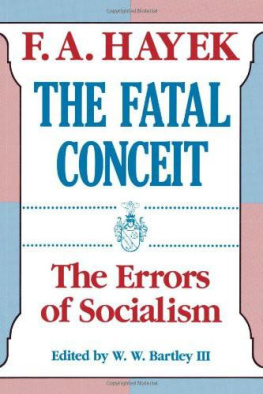John Gray - Hayek on Liberty
Here you can read online John Gray - Hayek on Liberty full text of the book (entire story) in english for free. Download pdf and epub, get meaning, cover and reviews about this ebook. year: 2013, publisher: Taylor and Francis, genre: Science. Description of the work, (preface) as well as reviews are available. Best literature library LitArk.com created for fans of good reading and offers a wide selection of genres:
Romance novel
Science fiction
Adventure
Detective
Science
History
Home and family
Prose
Art
Politics
Computer
Non-fiction
Religion
Business
Children
Humor
Choose a favorite category and find really read worthwhile books. Enjoy immersion in the world of imagination, feel the emotions of the characters or learn something new for yourself, make an fascinating discovery.
Hayek on Liberty: summary, description and annotation
We offer to read an annotation, description, summary or preface (depends on what the author of the book "Hayek on Liberty" wrote himself). If you haven't found the necessary information about the book — write in the comments, we will try to find it.
Hayek on Liberty — read online for free the complete book (whole text) full work
Below is the text of the book, divided by pages. System saving the place of the last page read, allows you to conveniently read the book "Hayek on Liberty" online for free, without having to search again every time where you left off. Put a bookmark, and you can go to the page where you finished reading at any time.
Font size:
Interval:
Bookmark:
Third Edition
John Gray

First published 1984 by Basil Blackwell Ltd
Second edition 1986
Third edition published 1998
by Routledge
11 New Fetter Lane, London EC4P 4EE
Simultaneously published in the USA and Canada
by Routledge
29 West 35th Street, New York, NY 10001
Routledge is an imprint of the Taylor & Francis Group
This edition published in the Taylor & Francis e-Library, 2003.
1984, 1986, 1998 John Gray
The right of John Gray to be identified as the Author of this Work has been asserted by him in accordance with the Copyright, Designs and Patents Act 1988
All rights reserved. No part of this book may be reprinted or reproduced or utilised in any form or by any electronic, mechanical, or other means, now known or hereafter invented, including photocopying and recording, or in any information storage or retrieval system, without permission in writing from the publishers.
British Library Cataloguing in Publication Data
A catalogue record for this book is available from the British Library
Library of Congress Cataloguing in Publication Data
Gray, John, 1948
Hayek on liberty/John Gray.3rd ed.
p. cm.
Includes bibliographical references and index.
1. Hayek, Friedrich A.von. (Friedrich August), 1899Political and
social views. 2. Liberty. 3. Liberalism. I. Title.
HB101.H39G73 1998
323.44dc21 9751498
ISBN 0-203-00401-9 Master e-book ISBN
ISBN 0-203-20944-3 (Adobe eReader Format)
ISBN 0-415-17315-9 (Print Edition)
DOI: 10.4324/9780203004012
In the Postscript to this new edition I have tried to assess Hayeks thought by reference to historical events since the publication of the books first edition in 1984 and by considering how well Hayeks thought copes with enduring problems of liberal political philosophy. The Postscript therefore reflects changes both in my own thinking and in the world at large.
John Gray
Though Hayeks central place in twentieth-century economic thought is uncontested, his general philosophy has yet to receive the sustained critical attention it merits. A major theme of this study is that Hayeks work composes a system of ideas, fully as ambitious as the systems of Mill and Marx, but far less vulnerable to criticism than theirs because it is grounded on a philosophically defensible view of the scope and limits of human reason. A related claim made in this study is that we find in Hayek a restatement of classical liberalism in which it is purified of errorsspecifically, the errors of abstract individualism and uncritical rationalismwhich inform the work of even the greatest of the classical liberals and which Hayek has been able to correct by absorbing some of the deepest insights of conservative philosophy. For these two reasons alone, Hayeks work should command the critical interest of philosophers and social theorists as well as political economists.
More fundamentally, however, Hayeks work initiates a paradigm shift in social philosophy and launches a new research programme in social theory. In ways I will specify in detail in the body of this book, Hayek displaces the focus of social philosophy from the preoccupations which have led the analytical school into an impassepreoccupations with the conceptual analysis of the main terms of political discourse and with the endless discussion of rival principles against a background of moral scepticismto the areas of epistemology and philosophical psychology. His intuition is that a way of assessing different social systems more fruitful than the traditional method of appraising their moral content is to be found in illuminating the demands they make upon the powers of the mind and the uses they are able to make of human knowledge. His conclusion is that, once we have arrived at a realistic picture of the powers and limitations of the human mind, we see that many important social doctrinesthose of socialism and interventionist liberalism, for example,make impossible demands upon our knowledge. Even the liberalism of John Stuart Mill, for all its harping on the fallibility of our beliefs, embodies a navely rationalistic conception of the relations of the individual mind with its cultural inheritance of tradition. Hayek on liberty transcends the rationalistic fallacies which disfigure Mills liberalism and gives us a defence of individual freedom without equal in modern thought. Hayeks work has every claim to occupy a distinguished place in the mainstream of contemporary philosophy.
This brief study has been assisted by a large number of people. Among those who have commented on the manuscript at various stages in its evolution, or with whom I have had extended discussions on Hayekian themes, I would like to thank particularly W.W.Hartley III (whose biography of Hayek will be a notable event in Hayek scholarship), Norman P.Barry, Samuel Brittan, James Buchanan, Tim Congdon, Walter Eltis, Milton Friedman, Sir H.J.Habbakuk, Donald Hay, Nevil Johnson, Israel Kirzner, Irving Kristol, Robert Nozick, J.C.Nyiri, Michael Oakeshott, Dr D.A.Rees, Murray Rothbard, G.L.S.Shackle and Jeremy Shearmur (whose important work on Hayek, shortly to be published in a book, has contributed a valuable reference point for my own, especially where our interpretations have differed widely). I wish to thank most warmly Professor Hayek himself, for the unstinting generosity and unfailing patience with which he has dealt with my innumerable (and often illformulated) questions and criticisms, and to Professor Hayeks secretary, Mrs C.Gubitt, for her assistance in revising the Bibliography.
I acknowledge permission to publish the following extracts: The Liberalism of Karl Popper from Government and Opposition, Vol. II, no. 3 (Summer 1976), pp. 33755 and Spencer on the Ethics of Liberty and the limits of State Interference from History of Political Thought, Vol. III, no. 3 (Winter 1982), pp. 46581.
I am grateful to the Principal and Fellows of my College for granting me two periods of sabbatical leave during which I was able to bring the book nearer completion. I wish to express my gratitude for the assistance given me in the early stages of my research by a small Research Grant in the Humanities awarded by the British Academy. Also, I wish to acknowledge a debt of gratitude to the Institute for Humane Studies in Menlo Park, California. Under the direction first of Kenneth S.Templeton Jr. and then Leonard P.Liggio, this excellent institution devoted to research and scholarship in the traditions of classical liberalism has since 1977 supported my studies of Hayek in many ways. With the invaluable support of Liberty Fund of Indianapolis the Institute enabled me to spend several summers in Menlo Park as a residential research scholar, pursuing my inquiries into Hayek in the context of colloquia on classical liberal thought operated by Liberty Fund. This book owes its origin to a monograph on F.A.Hayek and the Rebirth of Classical Liberalism published by the Institute in its excellent (but unhappily now defunct) journal Literature of Liberty. Without the interest shown in my work by Ken Templeton and Leonard Liggio, and the scholarly support given me at the Institute by John Cody and Walter Grinder, I am sure I would not have begun this book, still less finished it.
Finally, I would like to thank Carole Charlton in Oxford and Pat Ortega in Palo Alto for their work in deciphering my handwritten manuscript.
Font size:
Interval:
Bookmark:
Similar books «Hayek on Liberty»
Look at similar books to Hayek on Liberty. We have selected literature similar in name and meaning in the hope of providing readers with more options to find new, interesting, not yet read works.
Discussion, reviews of the book Hayek on Liberty and just readers' own opinions. Leave your comments, write what you think about the work, its meaning or the main characters. Specify what exactly you liked and what you didn't like, and why you think so.

